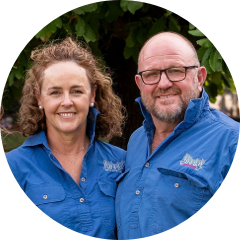Irrigation discussion groups
This project was completed in 2025
WHY THIS PROJECT WAS NEEDED
GRDC have invested in a suite of irrigation research projects across the southern irrigation zones, including projects looking to develop and validate soil amelioration and agronomic practices for irrigated grain crops, as well as maximising the dollar return per megalitre of water.
To tie these research projects more closely with farmer needs, farmer-driven irrigation discussion groups were established across the southern region to enable farmers to be more actively involved in the irrigated grains research process.
In short: This project linked GRDC's irrigation research with local farmer-driven groups. Farmers collaborated, learned, and had the opportunity to shape local research to maximise water efficiency and profitability in irrigated grain farming systems.
This project linked new and innovative research investments by GRDC with local farmer-driven groups, to improve the adoption of practices that improve the efficiency and sustainability of irrigated crop production.
The project followed on from the Facilitated Action Learning Groups to support profitable irrigated farming project.
Project focus
This project supported irrigation farmers to learn from one-another and build new peer and industry networks. The group provided access to the latest research data and allows farmers to shape project trial work to ensure it is relevant and meeting local needs.
The discussion group also provided an opportunity for farmers to experiment with new techniques, research methods or the development of an idea through local focus paddock trials on a local property.
The Irrigation Discussion Group met three times each year to discuss agronomy and soil trials in the region, as well as the implications of the research results at a local level. This feedback is being used to ensure research delivered is relevant to farmers and farming businesses.
Project outcomes
As part of this project, a focus paddock trial was established at Howlong in southern NSW from 2023–2024to investigate how much nitrogen was supplied to a maize crop by a high-density legume mix when it was made into silage or green manured, compared to adzuki beans, and what were the economic outcomes.
Key messages from the trial were that:
- A demonstration trial at Howlong highlighted how poultry manure applied at 6t/ha, a high-density legume mix brown manure and adzuki bean rotation can provide significant amounts of nitrogen to the following maize crop (105 kg N/ha, 130 kg N/ha and 169 kg N/ha respectively).
- In contrast to other rotations, a high density legume mix made into silage significantly reduced the amount of nitrogen available to the following maize crop (54 kg N/ha) due to removal (offtake) of nitrogen in the silage.
- Brown manuring a high-density legume mix was significantly less profitable than harvesting high density legume as silage, even when the additional nitrogen fixed by the brown manure over a six-month period was taken into account. •
- A nitrogen budget is useful for determining how much nitrogen to apply — for a 20 t/ha maize crop, the total nitrogen requirement is 512 kg N/ha. A deep soil nitrogen test taken after a legume crop allows farmers to more accurately calculate the requirements for the following maize crop.
- Poultry manure can also be a source of nitrogen and other nutrients including potassium, sulfur and phosphorus for irrigated crops, but these won’t all be available in the year of application.
Learn more about the trial and its outcomes by reading the full report: Comparing nitrogen returns from different legume rotations for a maize crop at Howlong, as published in Research for the Riverine Plains, 2025.
Find out more
For further information about the project, please contact Riverine Plains Senior Project Manager, Kate Coffey at kate@riverineplains.org.au
Project investment
This is an investment of the Grains Research and Development Corporation (GRDC).
Partners
Focus areas
MORE ON Grains
Our research enhances food production, increases environmental resilience and improves community connection across the Riverine Plains. See how our research creates impact.
-
Grains
Sustainability
-
Grains
Business
-
Grains
Sustainability
-
Grains
Livestock
-
Grains
Livestock
-
Grains
Sustainability
-
Grains
Business
-
Grains
Sustainability
-
Grains
-
Soils
Grains
-
Grains
Soils
-
Drought
Grains
-
Soils
Grains
-
Grains
-
Grains
Soils
-
Soils
Grains
-
Fodder
Grains
-
Grains
-
Grains
-
Grains
Soils
-
Sustainability
Grains
-
Grains
Sustainability
-
Soils
Grains
-
Grains
Sustainability
-
Livestock
Grains
-
Grains
Soils
-
Sustainability
Grains
JOIN RIVERINE PLAINS
Riverine Plains provides opportunities to see new research and innovation, connect with rural communities, and attend informative events.


